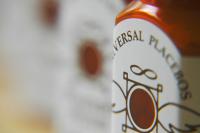What a difference a mention in the NY Times makes! There’s been an incredible amount of web traffic generated by a website advertising ‘Obecalp‘ (‘placebo backwards), including a very lively debate at one of our favourite sites, Boingboing
In the Boingboing exchanges, most people are objecting to (a) enculturating kids into pill-popping behaviours, and (b) deceiving kids about the actual nature of the pill. Nobody’s gainsaying the operation of the so-called placebo effect, it seems to be more about the parenting issues …
I guess the same objections would be raised to behaviour like putting a Flintstones-themed band-aid on a bumped knee that didn’t actually need a band-aid, with the assurance that this would ‘make it better’…?
Two things, in defence of the placebo-as-pill approach (and astute readers will be aware that the placebo effect can also be engaged through sham injections, sham surgery … and possibly Mystical Words Uttered Backwards Under a Full Moon and so forth …
As conscious purveyors of placebos, we’re concerned with the potential of the placebo effect to inspire self-healing. We don’t recommend that people lie about or misrepresent our product: it’s a sugar pill, inert, side-effect free … BUT the placebo effect exists, and there is some evidence to show that people ingesting a placebo *in the awareness that it’s a placebo* may still gain some benefit. That’s the ‘honesty in parenting’ bit.
As to the pill-popping-culture bit, well … perhaps. One of our team is a homeopath, and consequently aware of the materialist critique that homeopathic remedies are also nothing else but placebos. In general, our feeling is ‘so what? If there’s no deception and misrepresentation, and the things actually work, what’s the harm?’
We understand the passion and the aggro, to an extent. Nobody likes the idea of ripping people off and leveraging the pain of children. But we can assure you there’s a case to be made for harmless and light-hearted exploration of the placebo effect, and especially for the questions it raises about the same pill-popping culture that encourages conventional practitioners to regularly use ineffective treatments (such as prescribing antibiotics for viral infections).


